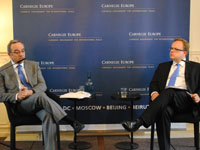Registration
Thank you!
You will receive an email confirming your registration.
IMGXYZ2995IMGZYXThe revolutionary change sweeping across the Arab world has called into question whether there is a realistic chance for a peace agreement between the Arabs and Israelis, given the current political turmoil.
Carnegie’s Marwan Muasher, former foreign minister and deputy prime minister of Jordan, discussed the importance of reaching a lasting, regional solution to the Arab-Israeli conflict and offered his opinion on whether the Arab Spring creates an opportunity for peace. Carnegie Europe’s Jan Techau moderated.
Addressing Peace in a Time of Change
- The Time is Now: While many international actors feel that the current atmosphere of political change is not conducive to pushing the peace process forward, Muasher argued the opposite is true. The international community is in the midst of reexamining its policies toward the Middle East and any policy that ignores the peace component will fail to gain credibility in the region.
- Incorporating the Peace Component: In the past, the international community’s policies toward the Middle East, particularly those of the EU and the United States, have emphasized stability in the region, sometimes at the cost of promoting reform, Muasher said. Whenever stability efforts clashed with reform efforts, stability always took priority. Muasher added that all too often, the peace initiative was pursued without acknowledgment of the links that exist among peace, reform, and stability. He stressed that any new policy for the Middle East needs to look at all three issues holistically and understand how they are connected.
Palestine
- Palestinian Frustration: In the absence of a peace process and negotiations, Palestinians feel that the status quo is not sustainable, argued Muasher. If the international community makes no serious movement on the peace process in the coming months, popular upheavals in the Palestinian territories are likely. There is a growing desire among Palestinians to resolve the conflict rather than continue to manage it.
- Israel Should Take Action Now: Israel needs to understand that the Arab world has changed. If Israel does not take action on the peace issue, the Arab world could become even more critical of Israel than it is today, said Muasher.
Moving Forward
- Third-Party Intervention: Muasher explained that since the Israeli government has not shown any interest in engaging in a peace process, third-party intervention is necessary. He added that such intervention should be led by the Middle East Quartet, which includes the UN, the EU, the United States, and Russia. The Quartet would likely support a solution that combines the Clinton parameters along with the Arab peace initiative, which would then be voted on in a referendum by the Israeli and Palestinian publics.
- Two-State Solution: Israel must understand that a two-state solution is in its own interest. To achieve a two-state solution, the issue of security must be addressed by the international community, noted Muasher. Arabs would be willing to be extremely forthcoming on security guarantees for Israel in return for a Palestinian state.
- Recognizing Palestine as a State: In September, the United Nations will vote on whether to recognize Palestine as a state. While many observers did not originally take the upcoming vote seriously, this view has changed, noted Muasher. Eight Latin American countries recognize Palestine as a state and various EU members, including Great Britain and France, are seriously considering whether to recognize its statehood.
